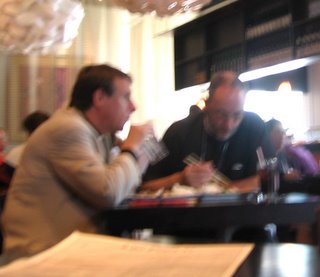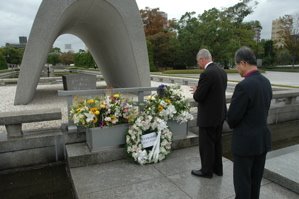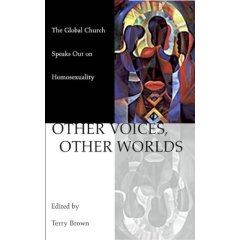
It's a lazy, vacation Monday and I am totally enjoying being OFF! The sun is shining, the roses are pruned, the laundry is done, the dogs are napping and we have friends coming for dinner on the patio in a little while. So I've allowed myself the indulgence of plodding around the blogosphere I've tried to stay a little detached from for at least some of the lazy-hazy-etc. days of summer.
In the process I came across this piece I wrote a while back when I was blogging for the
Every Voice Network and in reading it over found myself thinking "I couldn't have said it better myself" ... which of course I did.
An Ontological Argument: April 2005"... it seems to me that the essential matter at hand is not sexuality but baptism – and the essential question on the table is, “Will this be a church where all of the baptized are fully included in the Body of Christ or not?”
It also seems to me that whatever “threat to the unity and mission of the Anglican Communion” we are currently experiencing must be firmly laid at the feet of the committed percentage of the American conservative fringe whose criterion for being included is being agreed with. Finding that they have been repeatedly disagreed with by the duly selected representative voice of the Episcopal Church on this baptismal question their quest has shifted to orchestrating an “end run” on the historic polity of the Episcopal Church – successfully escalating an ongoing family fight into an international schism.
To further that end, in the months since General Convention 2003 every time there has been any hope of reconciliation, whiff of compromise or effort to seek the classical via media they have skillfully upped the ante, leading us to this seeming impasse on this decades old disagreement du jour. For if we are going to be honest about our differences – about this “impaired communion” – then we must trace them not to 2003 and the consecration of the Bishop of New Hampshire but to 1974 and the ordination of the Philadelphia Eleven.
If the criteria for impaired communion are our differences on who among the baptized may exercise ordained ministry – on whether or not the orders of all our bishops will be received throughout all of the Communion -- then our communion has been impaired for over thirty years – indeed, we are not in agreement on that yet within our own American Episcopal Church!
I remember well my experience at General Convention 1994 in Indianapolis when ECUSA bishop, Bill Wantland, explained to me that I had tremendous gifts for ministry but could never “be” a priest because I was “ontologically incapable of being an efficacious bearer of a sacramental presence.”It was a very clarifying moment.
According to Bishop Wantland, the very essence of my being – my “ontology” as a woman – prohibited me from exercising sacramental ministry. And yet, we have managed to muddle along, he and I, in the same church – impaired communion and all – for lo these thirty-something years.
What has changed? Why is THIS issue – the fuller inclusion and gay and lesbian people into the mission and ministry of the church – THE issue that will split the church when we have managed to work through so many others in the past? We have for decades lived in communion with those who differ on the role of women in ordained ministry in spite of those differences. Why has the ordination of an openly gay bishop – the blessing of gay unions -- become the “defining issue of orthodoxy?”
I actually got to ask that question of David Anderson (president of the American Anglican Council) just a few months before GC2003. And like my 1994 conversation with Bill Wantland it was another clarifying moment.
David was a clergy colleague of mine in Los Angeles for many years. We agreed about a few things and disagreed about more but were nevertheless “in communion” with each other. We ate lunch together once a month for a year with other clergy colleagues reading and discussing the catechism together as part of a dialogue and reconciliation effort by our bishop. We ran into each other at early morning “Mananitas” services for the Cursillo community to which we both belonged. Heck, I sang in a praise band that was part of the prayer team in David’s hotel suite the night before the episcopal election in the Diocese of Pittsburgh when David was on the ballot.
Yes, we were always at opposing microphones when debates happened on diocesan convention floor, but at one time it seemed that the essentials of the beliefs we held in common were more important than the very real differences that sometimes kept us apart.Until 2003. A few months before Minneapolis and GC2003 we were both part of a pre-convention meeting between AAC and Integrity “core leadership.”
After a long discussion I finally said to David, “We’ve been at this for decades, you and I, agreeing to disagree about any number of things. Help me understand why THIS issue is the one that you believe will finally split the church – why is this disagreement one we cannot overcome?”
And David said to me, “Because genital activity is so important to God that God has drawn a fence around it – and within that fence is only a man and a woman within the sanctity of marriage. Anything outside the fence is not subject to blessing and for the church to do so is to unravel the very fabric of the faith.”
Excuse me? If I heard David right – and in checking with my colleague in the room at the time I am assured that I did – the essential matter … the thing that matters MOST to God … is “genital activity?” I’ve got first year EFM students who could make compelling rebuttal to that contention – along with the Old and New Testaments, the received tradition and “reason” by any reasonable definition.
Is that the only argument David has to offer? Of course not – but it was clarifying to me that for the Reverend Canon David Anderson, President of the American Anglican Council, it was a defining one. It was clarifying to me because it was a window into just how far beyond the bounds of historical Anglicanism this small band of conservative reactionaries are willing to go in their quest to turn the Episcopal Church into something neither Hooker nor Seabury would recognize and my sainted Aunt Gretchen – who died with a “Save the 1928 Prayer Book” bumper sticker on her car – would find shocking.
And it has led me to conclude, in the weeks and months since that meeting, that what we are seeing play out around us has less to do with the essentials of the faith than it does with an exit strategy – an exit strategy devised by those who have determined to split this church rather than continue to live in communion with those with whom they disagree.
It is a strategy under-girded by a virulent absolutism that seems to justify any means toward the end of “preserving orthodoxy” and is, in fact, working to destroy the unity of the church while placing the blame for the break up with those of us who have repeatedly committed to STAY in communion with those with whom we disagree.
A prime example is the current attack on the Bishop of Connecticut -- the “exhibit du jour” in a long line of scenarios where a vocal minority have intentionally painted themselves into a corner by active defiance of established Episcopal polity – all justified, of course, because they alone are privy to “The Clear Truth” – and then cry “victim” when their bishop acts like one.
Which leads me to my own “ontological argument” and it is this: there is an essential difference between feeling excluded because you are not agreed with and BEING excluded because of who you are.
The current “persecution of the orthodox” in so-called “liberal dioceses” is nothing more than the self-fulfilling prophecy of the spoiled, entitled childish behavior of those pitching a fit after being told they must learn how to work and play well with others. The Gospel for Easter 5 tells us that in our Father’s house there are many mansions. St. Paul tells us that essential to the Body of Christ are its many members. And our historic tradition as Anglicans tells us that when we live into the true via media we CAN hold in tension perspectives that others find “mutually exclusive” (catholic and protestant come to mind!)
It is long past time to leave the tantrum throwers to their kicking and screaming -- just like I did to my own young sons when they tried the “my-life-is-over-if-you-don’t-buy-me-the-Cocoa-Puffs-fit” in the cereal aisle. Sometimes, no matter how you yearn to reason them out of their tantrum, you just have to keep the shopping cart moving.
And I believe we have reached that point in this ecclesial tantrum that is threatening to consume us. It is time for the church to move on – to GET on with the work of the church: feeding the hungry, healing the sick, liberating the captive and proclaiming the Good News of God in Christ Jesus available to ALL! Those are the “essential matters of faith and practice” that should be consuming our energies in this Anglican Communion – in this Episcopal Church.
And so may God give us the grace to get back to this work we have been given to do – this Gospel we have been charged with proclaiming – praying all the while that the tantrum will end and we might find unity in the places we can agree and the grace to disagree agreeably in the places we cannot.













